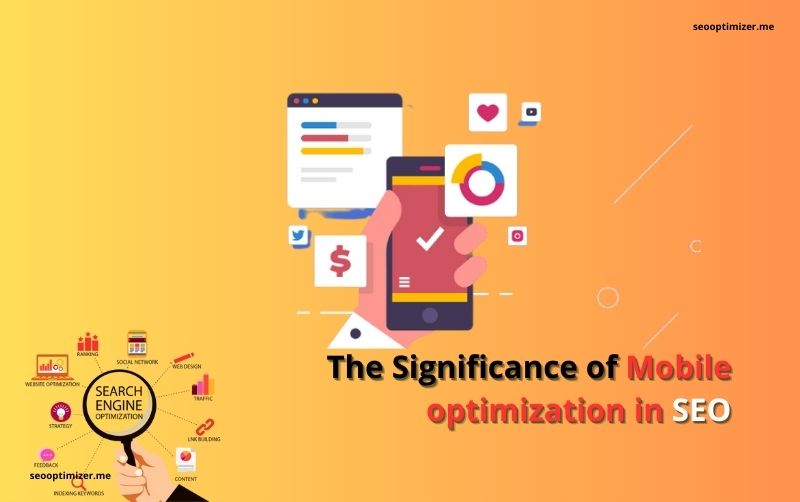The Significance of Mobile Optimization in SEO

According to Statista, as of 2021, there are over 3.8 billion smartphone users worldwide, and this number is projected to increase to 4.3 billion by 2023. With the proliferation of mobile devices, it is crucial for businesses to ensure that their websites are optimized for mobile devices to ensure maximum visibility and engagement. Mobile optimization is the practice of optimizing websites to rank higher in search engine results pages (SERPs).
This article explores the significance of mobile optimization in SEO and how it can affect a business's online presence if it is not properly done.
Suggested read: The Role of Backlinks in SEO and How to Acquire Them
What is Mobile Optimization?
Mobile optimization refers to the process of designing and developing a website that is responsive and easy to use on mobile devices such as smartphones and tablets. This involves making changes to the website's design and functionality to ensure that it is user-friendly and easy to navigate on smaller screens.
Why is Mobile Optimization important for SEO?
1. Mobile-First Indexing
Mobile-first indexing is a term used by Google, which means that Google predominantly uses the mobile version of a website's content for indexing and ranking. This means that if a website is not optimized for mobile devices, it will likely rank lower in search engine results pages. As more and more people use mobile devices to access the internet, it is becoming increasingly important for businesses to have a mobile-optimized website to ensure that they are not missing out on potential traffic and customers.
2. Improved User Experience
A mobile-optimized website provides a better user experience for visitors who access it on a mobile device. A mobile-optimized website is easier to navigate, loads faster, and is more visually appealing, which can lead to higher engagement and lower bounce rates. A website that is not optimized for mobile devices can be difficult to navigate, and visitors may leave the website quickly, resulting in a high bounce rate. A high bounce rate is a negative signal to search engines, indicating that the website is not providing a good user experience, which can lead to lower rankings in SERPs.
Also read: SEO Auditing & How to Conduct an SEO Audit for a Website
3. Increased Mobile Traffic
As mentioned earlier, the number of mobile users worldwide is increasing rapidly. According to Statista, mobile devices accounted for 54.8% of all website traffic in the first quarter of 2021. This means that businesses that have a mobile-optimized website are more likely to attract mobile traffic, which can result in increased leads, sales, and revenue. On the other hand, businesses that do not have a mobile-optimized website are likely to miss out on potential mobile traffic, which can negatively impact their online presence.
4. Local SEO
Local SEO is an important aspect of SEO for businesses that have a physical location, such as a store or office. Local SEO involves optimizing a website for local search queries, such as "plumber near me" or "best coffee shop in [city]." Mobile optimization is crucial for local SEO because mobile devices are often used to search for local businesses. A mobile-optimized website can help businesses to rank higher in local search results and attract local customers.
Suggested read: Beginners Guide to ON-Page SEO
5. Voice Search Optimization
Voice search is becoming increasingly popular with the rise of virtual assistants such as Siri and Alexa. Voice search queries are often longer and more conversational than text-based search queries, which means that businesses need to optimize their website for voice search. Mobile optimization is crucial for voice search because most voice searches are performed on mobile devices. A mobile-optimized website that is easy to navigate and provides relevant information can help businesses to rank higher in voice search results.
How to Optimize a Website for Mobile Devices
Now that you understand the significance of mobile optimization in SEO, below are how you can optimize your website for mobile devices
Suggested read: SEO and Everything in-Between
1. Use Responsive Design
Responsive design is a technique that allows a website to adjust its layout and content based on the screen size of the device it is being viewed on. A responsive website will look and function the same on both desktop and mobile devices. It is essential that you use responsive design to ensure that their website is optimized for mobile devices.
2. Use a Mobile-Friendly CMS
A Content Management System (CMS) is software that allows businesses to manage their website content without requiring technical knowledge. When selecting a CMS, it is important to choose one that is mobile-friendly. You can use CMS platforms like wordpress, WIx, blogspot, webflow and so on.
3. Optimize Images
Images are an essential part of any website, but they can also slow down page load times, especially on mobile devices. It is important that you optimize your website images for mobile devices by compressing their file size and using the correct image format.
Suggested read: 11 Common SEO Mistakes you Should Avoid
4. Simplify Navigation
A mobile-optimized website should have a simple and easy-to-use navigation menu. The menu should be easy to access, and the links should be large enough to be clicked on a mobile device. It is also important to ensure that the website's content is organized in a logical and easy-to-follow structure.
5. Use Mobile-Friendly Fonts
Fonts that are easy to read on a desktop computer may not be as easy to read on a mobile device. It is important to use mobile-friendly fonts that are easy to read on smaller screens. A font size of at least 14 pixels is recommended for mobile devices.
6. Test and Monitor
Once you have optimized your website for mobile devices, it is important to test it on different devices and monitor its performance. This can help you to identify and fix any issues that may be affecting the website's performance on mobile devices.
Also read: Best Guide for Keywords Usage in SEO
What's Next –
Start SEO Optimization. Analyze your website with Free SEO Optimizer
Audit your website for Free - SEO audit free
Suggested reads:
Also read: SEO for Beginners – Ultimate Guide
Also read: RoadMap to Becoming An SEO Expert
Also read: 15 Top SEO Experts and Specialists
Also read: AI SEO – The Impact of Artificial Intelligence on SEO Strategies
Also read: Google Indexing and How Web Crawler Works




